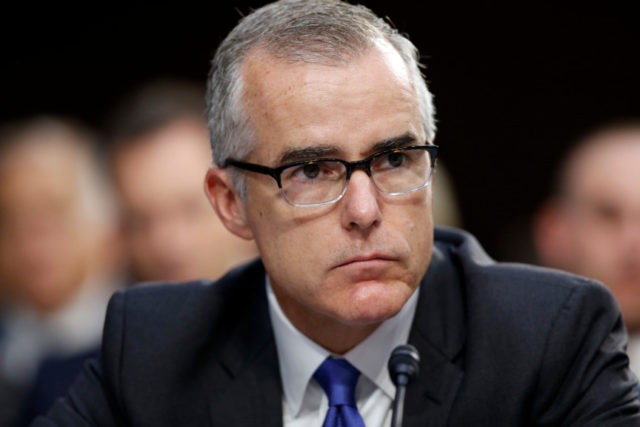Andrew McCabe, the disgraced former acting FBI director, described in his new book how the so-called Russia collusion investigation into President Donald Trump was pursued quietly so as not to damage the probe itself by tipping off sources or targets.
McCabe’s statements undermine the talking point espoused most notably by ex-FBI agent Peter Strzok, who repeatedly claimed that the fact that the Russia probe was not leaked to the news media before the election was evidence of his own integrity. Strzok’s argument has been parroted frequently by some in the news media and many Democratic politicians in order to claim the FBI under the leadership of McCabe and James Comey was not biased against Trump.
In his anti-Trump book, titled, “The Threat: How the F.B.I. Protects America in the Age of Terror and Trump,” McCabe explained why the FBI’s Russia investigation was, as he put it, “pursued quietly.”
McCabe wrote:
Unlike the Clinton email investigation, which was inevitably public from the very start, and in that sense out of the ordinary for the FBI, the Russia investigation was pursued quietly, as virtually all Bureau cases are, for principled reasons.
There would have been little the Bureau could say even if saying little were not Bureau policy: Much of what we knew was based on intelligence that could not be revealed without damaging sources or alerting unfriendly actors to their existence. Going public would have impeded the investigation itself.
McCabe further wrote that alerting the public to the investigation would have done the Russians’ bidding for them:
There was also a political issue, which President Obama and his advisers had to wrestle with. Sounding the alert in the middle of a national election, when the full picture was not yet known, could be perceived as an attempt to sway the electorate. At the very least, it would cause widespread confusion and dismay — doing the Russians’ work for them.
Those statements don’t bode well for Strzok’s central thesis offered as proof of his integrity and the FBI’s lack of bias against Trump during the 2016 presidential election.
Strzok presented that case during testimony last July to the House Judiciary and Oversight committees.
Stung by the release of his anti-Trump text messages, Strzok used the opening statement of his recent testimony to tout “one extraordinarily important piece of evidence supporting my integrity, the integrity of the FBI, and our lack of bias.”
He explained: “In the summer of 2016, I was one of a handful of people who knew the details of Russian election interference and its possible connections with members of the Trump campaign. This information had the potential to derail, and quite possibly defeat Mr. Trump. But the thought of exposing that information never crossed my mind.”
Strzok repeated that same argument at least four times during his hours-long testimony. Democratic lawmakers made the same point in their questioning of Strzok, with one even claiming the FBI agent had a “magic bullet” in his hands to “derail” Trump’s candidacy but never leaked the details.
The FBI’s probe of Russian meddling, focusing in part on Trump’s campaign, was initiated in July 2016, but was not revealed officially to the public until after the election took place.
Strzok’s claim that his alleged discretion on the Russia meddling probe served as “evidence” of his lack of bias was further brandished by news media outlets.
“Peter Strzok just gave a hard-to-rebut defense of the objectivity of the Russia investigation’s origins,” was the title of an analysis piece in the Washington Post.
“FBI agent destroys anti-Trump conspiracy theory with ‘one extraordinarily important piece of evidence’” was the title of a piece in the Mirror.
The Huffington Post ran an article on the topic with the sub-headline: “FBI veteran highlighted a gaping flaw in the GOP’s theory the ‘deep state’ worked against Trump.”
The liberal Think Progress went so far as to claim, “Republicans’ favorite FBI conspiracy theory goes up in smoke during Strzok hearing.”
McCabe, meanwhile, faces controversy himself over his own actions relating to Trump’s presidency.
In April, the Justice Department inspector-general (IG) referred McCabe to Washington’s top federal prosecutor after the IG’s report found that McCabe had lied to investigators or Comey four times, including on three occasions when McCabe was under oath.
McCabe has also faced controversy over a much-debated text message from Strzok, who helped lead the bureau’s probe of Hillary Clinton’s email server. According to the four-page Republican House Intelligence Committee memo authored by Rep. Devin Nunes (R-CA), the Strzok message reportedly referred to “a meeting with Deputy Director McCabe to discuss an ‘insurance’ policy against President Trump’s election.”
Addressing McCabe’s book last week, White House Press Secretary Sarah Sanders said McCabe “was fired in total disgrace from the FBI because he lied to investigators on multiple occasions, including under oath. His selfish and destructive agenda drove him to open a completely baseless investigation into the President. His actions were so shameful that he was referred to federal prosecutors. Andrew McCabe has no credibility and is an embarrassment to the men and women of the FBI and our great country.”
Trump took to Twitter to excoriate McCabe following the release of the book last week.
Aaron Klein is Breitbart’s Jerusalem bureau chief and senior investigative reporter. He is a New York Times bestselling author and hosts the popular weekend talk radio program, “Aaron Klein Investigative Radio.” Follow him on Twitter @AaronKleinShow. Follow him on Facebook.
This article was written with research by Joshua Klein.

COMMENTS
Please let us know if you're having issues with commenting.